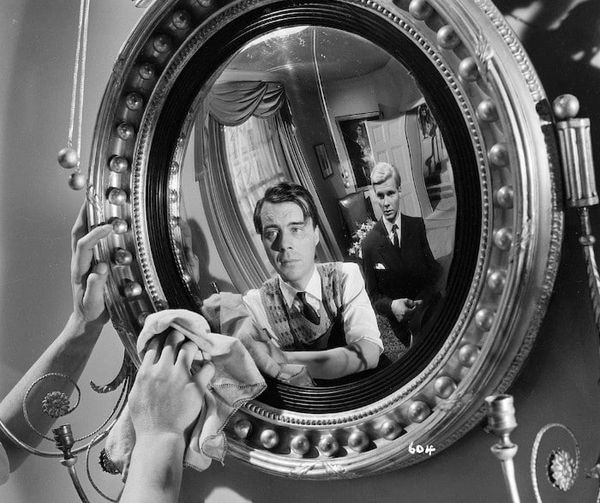Eye For Film >> Movies >> The Servant (1963) Film Review

The snow we see falling outside the home the moneyed Tony (James Fox) has just bought might as well be coming from the ceiling itself, given the chill that envelops this film about psychological power games. His money is old, his attitude louche, so there's no wonder the idea of having a "manservant" appeals. "I need... everything." he airily tells Barrett (Dirk Bogarde), the man who gets the job and whose northern vowels and near forelock-tugging deference mark out his place in the pecking order.
This was the first of three films in which Losey and writer partner Harold Pinter (adapting here from a novella by Robin Maugham) would turn a gimlet eye onto the subject of class and, more widely, social standings, with Accident following in 1967 and The Go-Between in 1971 - and if you want to see its lasting resonance with other filmmakers, you need look no further than Bong Joon Ho's Parasite. As with the later Go-Between it's not just the architecture of the relationships but the space they occupy which is crucial, with the house - not much more than a shell when we first see it - becoming a gilded cage, where Tony will find himself increasingly trapped by his own addictions. Bogarde, proving not for the first time that he was a whole lot more than just a pretty face, brings a real subtlety and edge to Barratt. He may be deferential, his slightly camp affectations also diminishing his sense of threat in the eyes of Tony, but the star lets just enough of the Machiavellian flicker through to let us know there's more to this than first appears.

Tony's girlfriend Susan (Wendy Craig, on the top of her game), is also suspicious. Pinter shows, through the script, that as someone who, by dint of her sex, is much more familiar with being on the wrong end of power games than Tony, she is considerably more aware of Barrett's machinations and equally more used to having to employ manipulations of her own. The bigger scheme becomes apparent to us when Barrett persuades Tony to let his "sister" Vera (Sarah Miles) move in as a maid, the richer man little suspecting the sort of honey trap that is about to be set. We soon see Bogarde's Barrett is a master of providing the right thing at the right time, whether its the chocolate bar Vera excitedly chews on just after her arrival, or the cigar - or more lustful temptation - that appears at Tony's hand at just the right moment.
This is all just to scratch the surface of the plot which twists and turns with delightful precision as the relationships slip and become distorted like the reflections we repeatedly see caught in a convex mirror on one of the home's walls. Cinematographer Douglas Slocombe adds to the general air of unease with low and high camera angles, light and shade - so that, for example, Bogarde looms over Tony during their first meeting - all of this is presented its full glory thanks to a 4K restoration, which is in cinemas now before being released on DVD and Blu-ray on September 20.
Meanwhile John Dankworth's score, and particularly, the song All Gone, sung by his wife Cleo Laine, also proves increasingly ambiguous with every refrain. There's a homoerotic charge to some of the scenes between Fox and Bogarde but, as with The Go-Between Losey and Pinter are less interested than sexual manoeuvring itself than what that means in terms of who holds the upper hand. Everything becomes slippery and not quite what it first appeared. Take, for example, the bannister railings through which we often view Barrett's room. They may, at first, evoke the idea of a prison, but later there's a suggestion that perhaps they're penning in something far more wild than that. Barrett, after all, isn't playing the same game as Tony, who is so trammelled in by his belief in the constraints of the class system he can't see the freedom of manoeuvre the other man has until it's too late.
Reviewed on: 11 Sep 2021

















